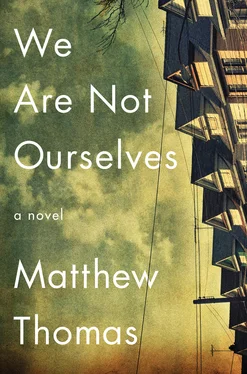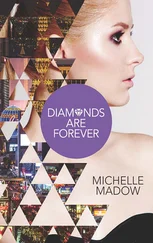• • •
He heard the garage door. His mother came up the stairs carrying some bags of groceries. She handed them to him and slung her pocketbook onto the island. She told him to put them away.
“Leave that chicken out,” she said. “I’m going to make it.”
She called in “Hello” to his father and filled a glass with water. Connell emptied the bags purposefully, trying not to look at her. When there was nothing left to find a spot for, he turned to see her taking down a second glass of water with deliberate sips, as though it were medicine. She was looking at him over the glass.
“I might send you to the store for garlic,” she said. “I forgot to get garlic.”
“Okay.”
“I’ve got to turn that down. I can’t hear myself think. Edmund!” she called again. “I’m home.”
She put her glass in the sink. There was a strange buoyancy in her step.
“Mom, wait.”
“What?”
“Something happened earlier. Dad got hurt.”
She started in his father’s direction. “What is it?” she asked with surprising panic in her voice. “What’s happened?”
She took the remote and lowered the volume on the television.
“What’s happened?” she asked again, sounding more alarmed than Connell had heard her sound, perhaps ever. “Are you going to tell me, or what?”
His father sat there like a statue, looking past her at the screen’s flashing, unaccompanied images.
“He fell down. I was out of the room. He landed hard on the bricks.”
“Let me look at you, Edmund. What did he hurt?”
“He fell on his face. Cut his chin. Broke his tooth.”
“Let me see your mouth, Edmund.”
His father sat stone-faced.
“Open up!” she said, sounding shrilly desperate. She turned to Connell. “How bad is it?”
“There was a lot of blood.”
“Open up!” she said. She sat on the couch and put her hand to his father’s mouth. She pried his lips open. He had his teeth squeezed shut, but Connell could see the space where his tooth had been. His mother didn’t turn and yell at him. She smoothed out his father’s hair and kissed his cheek.
“Oh, Edmund,” she said mutedly. “What are we going to do with you?”
“Nothing,” his father said finally. “Nothing. Leave me alone.”
He hadn’t taken his eyes off the television, but now he took one glance at Connell. There was embarrassment in the glance, but also something like a flash of defiance.
Connell waved his mother into the kitchen. She didn’t follow him right away. He stood away from the doorway while he waited for her, because he didn’t want his father to see him. He was ashamed.
The volume went back up, and a few moments later his mother came in.
“What is it?”
“I don’t think I can do this,” Connell said, his hands against the edge of the countertop.
“Do what?”
“This thing with Dad. I don’t know.”
“What happened ?”
He looked down. “He fell. That’s all.”
“Well, you just have to keep a better eye on him.”
“That’s what I’m saying. I don’t think I can do it. I thought I could do it. But I can’t. It’s too hard for me. It’s too much.”
“I did it when I was ten years old.”
“But I’m not you,” he said. “That’s the problem right there.”
“Well, that’s just terrific,” she said. She motioned for him to move and took a cutting board out of the cabinet below.
“It’s driving me crazy,” he said.
“What do you think it’s doing to me?”
“You go to work.”
“I never go anywhere,” she said. “All day long, I’m right here in my mind.”
“I’m sorry. I don’t want to disappoint you.”
She sliced through the thin layer of plastic on the chicken. “Don’t worry about disappointing me. Worry about leaving me in the lurch. I need help, goddammit!”
“I can get a job. Bring some money in. You can pay someone with it.”
“Keep your money,” she said. “You’re going to need it for therapy later.”
“That’s cold.”
“I thought it would be good for him, for you ”—she pointed with the knife—“if you were around. If it’s not, it’s not.”
“I wish I could do it,” he said.
“You can,” she said. “You just don’t know it.” She had started to cut the chicken, but she set the knife down. “Here,” she said. “You do this. You think you can handle it? Or you want me to find someone else to do this too?”
He felt the blood drain from his face. His mother seemed to notice. “Thin slices, across the breast,” she said a little more softly. She went to the refrigerator and brought back some broccoli. “Cut this when you’re done with that. Small pieces. My feet ache.” Then she went into the living room. He cut the chicken and rinsed the broccoli, but before cutting the latter he went to the doorway and leaned into the dining room to look at her. She had her legs up on the couch. She was holding one of the sheer curtains aside with one hand and rubbing at her foot with the other. She was looking out at the street and didn’t notice him there. He had an impulse to tell her he would rub her feet for her. When he was a kid, she would ask him to rub them, and he would grumble his way through it, because she worked all day and her feet were clammy and smelly. Her feet had only gotten more forbidding over the years, the soles tougher, the cracks deeper, but he wanted to rub them and not complain. He couldn’t find a way to tell her what he was thinking, so he just looked at her for a while. It seemed she was watching for something. He couldn’t remember the last time he’d seen her sitting there. When they first moved in, she sat there all the time.
He went back to the broccoli and cut it with heavy chops, because he remembered her saying she found the sound a knife made on a cutting board satisfying. When he was done he hacked at the bare board for a while, rhythmically so that it would sound like the real thing. He went into the living room. She had stopped rubbing her feet. She wasn’t looking out the window anymore but was sitting on the couch. She gave him a weary glance as he approached.
“What is it?”
“Can I help?”
“You chopped the broccoli?” He nodded. She let out a faint sigh. “I’ll be in to cook. Just leave everything there.”
“Can I help with your feet?”
“My feet ?”
“Do you want me to rub them?”
She had a wry expression on, as if she was weighing making a dry remark. Then she seemed to consider it further. “You’re offering to rub them,” she said dubiously.
He thought of the gap in his father’s mouth, the pool of blood under his father’s tongue.
It had been years since he’d touched his mother’s feet. He had half expected he’d never touch them again.
“Yes,” he said.
She raised her brows. “That would be nice,” she said.
He settled into the couch and took one foot in his lap as he used to. He was almost queasy with embarrassment at his proximity to her. He pressed a tentative hand against the ball of her foot. It was all there, the familiar moistness, the tufts of knuckle hair, the burst blisters, the gunky nails.
“Is your father all right?” she asked.
“He’s fine. Just watching TV.”
She seemed to relax, let her head fall against the pillow. He gave himself over to the task, using both hands to apply the proper pressure. Somehow he’d always been good at this. He’d had a certain amount of practice. His father would be busy in the study and his mother would put down the paper and ask if he’d rub her feet. There was something sweetly cajoling in the way she told him that she never sat down at work; it was the only time she ever behaved that way around him. Now, even more than before, he saw the evidence of what she’d been talking about. There was a history of her career in the bulging veins, the cramped muscles, the corns and bunions, the calluses and cracks. She wore neat shoes, but they covered a sprawling account of an overtaxed life, and there was no hiding the truth when she took them off.
Читать дальше
Конец ознакомительного отрывка
Купить книгу












